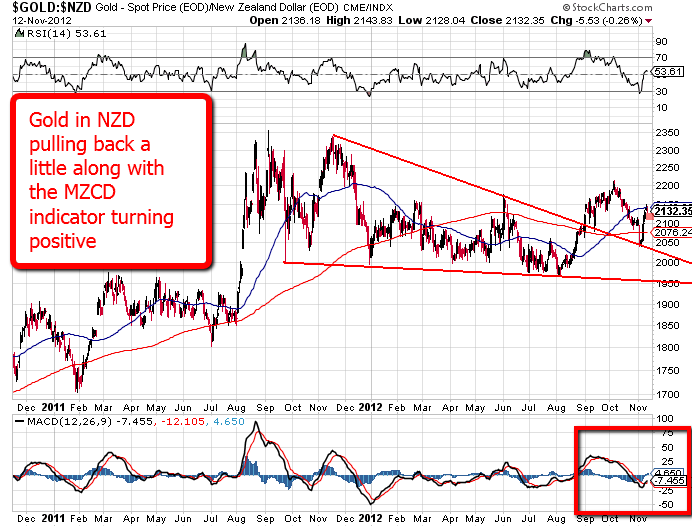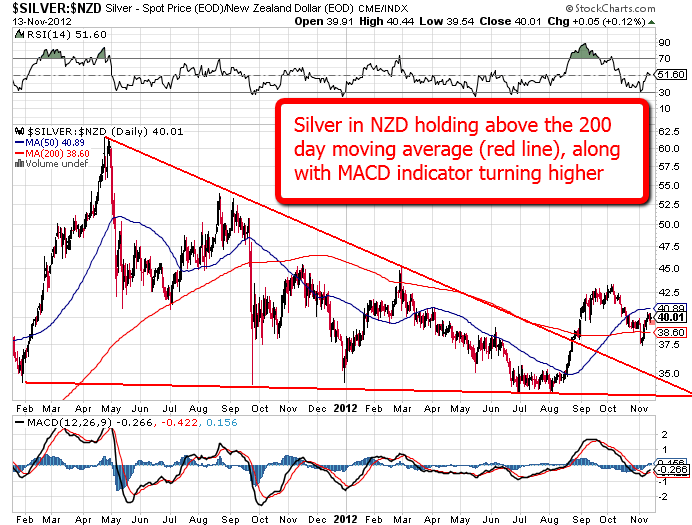This Week:
-
Gold and Silver in NZ Dollars: Indicators Turning
-
Gold Set to Start Next Rally
-
Extend and Pretend
-
RBNZ on QE and Open Bank Resolution
It’s been one of those weeks! We’re not only late sending this out but we also just haven’t quite gotten to writing up more of our notes from the Gold Symposium. But it’s in the plan for the end of this week so stay tuned we will have more to report. Meantime if you missed it, here is the link to our summary of how the monetary crisis will play out according to all the speakers.
Gold Symposium 2012: What is the End Game for the Global Monetary Crisis?
Gold and Silver in NZ Dollars: Indicators Turning
So far our guess remains that the recent correction of both gold and silver has likely found a bottom. But you had to be quick to get it. Both metals only briefly dipped down below the important 200 day moving average Monday week ago and you only had a day or 2 to be in at this level as is often the case.
Since we wrote last week we are up slightly in both metals. Gold is at $2116, up $43 per ounce from a week ago. Silver sits at $39.94 per ounce, up well over $1 from $38.67 last week. As David has been pointing out in our daily price alerts, the technical indicators do seem to have turned over the past week. The RSI overbought/oversold indicator bounced rapidly from the oversold region a week ago, while the MACD for both metals has just turned back up indicating momentum is turning positive again.


Gold Set to Start Next Rally
Carrying on the theme of important technical indicators, back in September we wrote how both gold and silver in NZ dollars were about to experience the golden cross. This is where the 50 day moving average crosses the 200 day moving average. (You can see on the charts above this occurred in early October). This is an indicator of a move back into a longer term bullish phase and likely start of the next leg up.
Well, earlier this week we came across an interesting chart on the topic in Money Morning Australia.
They outlined that after the golden cross gold tends to pull back which is what we have seen before heading higher again. But then they pointed that last time gold doubled following this. Bear in mind they are talking USD prices here so hence why the golden cross occurred earlier. However the chart is interesting nonetheless.
“…after the 2009 golden cross that set gold up to double, gold first pulled back and fell for the first 50 trading days or so. You can see this in the blue line below.
And so far, after the recent golden cross (Sept 19 2012), we have followed a similar path. This is the red line below.
After a golden cross, how long does gold take to start its rally?

Source: D&D Chart
If history repeats…gold should start its next multiyear rally within the next few weeks.
With fiscal cliffs, debt ceilings, as well as QE3, Chinese demand, and central banks buying – it’s not hard to imagine gold rallying from here.”
Extend and Pretend
With the US election charade over, you’ll have done well to avoid hearing about the “fiscal cliff” that will now need to be “solved”. This is a series of tax cuts that are due to expire, along with spending cuts due to be enacted in the New Year. We think the odds are they’ll now knock together some agreement that will keep things from falling apart for a while longer. The Republicans will hope it will do so until just before the next election. We still think the debt ceiling we mentioned last week, is just or even more important to focus on in terms of determining what the precious metals will do from here.
So it will be extend and pretend just as it was overnight in Europe where Greece will, for now at least, escape defaulting on 5 billion euros of treasury bills due on November 16th. Euro finance leaders have given Greece two more years until 2016 to reduce its deficit to 2% of GDP, so they will muddle on, all the while most likely sinking further into the hole. This whole fiasco could go on for sometime yet it seems.
RBNZ on QE and Open Bank Resolution
Back here in the land of the long white cloud (or rather grey if recent unemployment numbers are anything to go by), new Reserve Bank Governor Graeme Wheeler has featured in the business headlines a bit already in the past week or so.
Commenting here that rising house prices should slow due to increased supply over the next couple of years. But of course not making any mention how low interest rates, and RBNZ mandated lending criteria that encourages banks to lend 95% on residential property, impact house prices.
Then in his first session before Parliament’s finance and expenditure select committee “he told politicians that quantitative easing policy undertaken by central banks in the US, Japan and Europe were “a sign of desperation” and that New Zealand had scope to cut the benchmark interest rate if needed.
“If the issue is should we move to quantitative easing in New Zealand, we don’t think that’s something that deserves serious thought at this point,” Wheeler said.
He quashed suggestions lowering the official cash rate would rein in the strength of the New Zealand dollar, saying the currency is more closely aligned with the nation’s terms of trade over the long term than interest rate adjustments.
“It’s hard at this point to see any factor that would lead to a major depreciation in the exchange rate in the short-term,” he said. “There’s no easy solution out there that simply says cut interest rates 25 pips and the exchange rates will come off 10 percent, that just doesn’t work.”
Can’t disagree with him there – as we wrote a few weeks back in Why the Greens Are Wrong About Money Printing, any QE type measure will only have limited and short term impact.
The article went on… “Wheeler backed the level of local bank profits, saying lenders’ return on assets was about average among developed nations and low in terms of a return on equity. He didn’t agree with the view that high bank profits are the price New Zealand pays for financial stability.
“The banking system here as we see it at this point is healthy, it’s sound and it makes what we believe acceptable rates of return that aren’t out of line with international comparisons,” he said. “We see a lot of competitiveness and a lot of efficiency.”
Of course being able to create money out of nothing and charge interest to lend it is a pretty good business model so there should be plenty of “efficiency” and plenty of profits we’d say!.
The RBNZ also this month released its Open Bank Resolution (OBR) regulatory impact assessment and reckons it could save taxpayers a billion dollars. It’s a long read and we’ve only had time to skim it so far, so we will report back on that next week hopefully. If you don’t know what the OBR is, in a nutshell it’s planning for a bank failure, where the bank is shut down for a day and funds are frozen before reopening with potentially depositors taking a “haircut” on their funds. Read more on that here: Bank Failures: Could they happen in NZ? The RBNZ thinks so.
But in the meantime if you’d prefer not to rely on the Reserve Banks plan for a bank failure, and prefer to do your own planning by having some wealth in real money then get in touch:
1. Email: orders@goldsurvivalguide.co.nz
2. Phone: 0800 888 GOLD ( 0800 888 465 ) (or +64 9 2813898)
3. or Online order form with indicative pricing
Have a golden week!
Glenn (and David)
Ph: 0800 888 465
From outside NZ: +64 9 281 3898
email: orders@goldsurvivalguide.co.nz
| Another Bite of the Gold and Silver Cherry Presents Itself |
| 2012-11-06 20:11:28-05 |
This week: Another Bite of the Gold and Silver Cherry Presents Itself Obamney – Does it Matter Who Wins? The 75 Storey Debt Ceiling NZ Housing Un-affordability: It’s Not Supply, It’s the Debt Stupid! Another Bite of the Gold and Silver Cherry Presents Itself Friday in the US (Saturday NZT) saw a large fall in […]read more…
The Legal stuff – Disclaimer:
We are not financial advisors, accountants or lawyers. Any information we provide is not intended as investment or financial advice. It is merely information based upon our own experiences. The information we discuss is of a general nature and should merely be used as a place to start your own research and you definitely should conduct your own due diligence. You should seek professional investment or financial advice before making any decisions.




Pingback: NZ Bank Failure Planning, BASEL III & Will Banks Buy Gold?